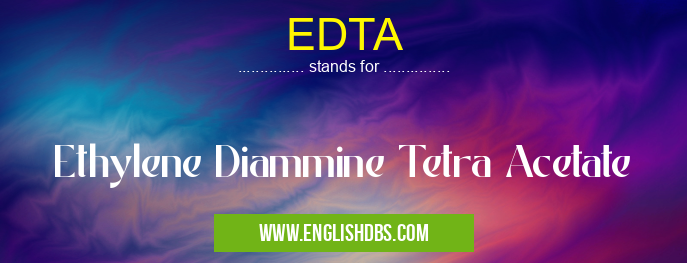What does EDTA mean in UNCLASSIFIED
EDTA, short for Ethylene Diamine Tetra Acetate, is a chemical compound commonly used in various applications.

EDTA meaning in Unclassified in Miscellaneous
EDTA mostly used in an acronym Unclassified in Category Miscellaneous that means Ethylene Diammine Tetra Acetate
Shorthand: EDTA,
Full Form: Ethylene Diammine Tetra Acetate
For more information of "Ethylene Diammine Tetra Acetate", see the section below.
Meaning and Use
EDTA is an amino polycarboxylic acid that forms stable complexes with metal ions. This property makes it effective in:
- Water Softening: By removing calcium and magnesium ions
- Chelating Agents: Binding to metal ions in industrial processes and pharmaceuticals
- Preservatives: Inhibiting metal-catalyzed oxidation in food and beverages
Structure and Properties
- EDTA has a molecular formula of C10H16N2O8.
- It consists of a central carbon atom surrounded by four nitrogen atoms and four acetate groups.
- EDTA is a colorless, odorless, and water-soluble crystalline solid.
Applications
- Industrial: Water treatment, textile dyeing, papermaking
- Medical: Blood anticoagulant, heavy metal detoxification
- Food: Preservative in canned foods, antioxidant in oils
- Analytical Chemistry: Complexometric titrations, metal ion analysis
Safety Considerations
EDTA is generally considered safe for use, but prolonged exposure can lead to skin irritation or respiratory problems. Proper handling and disposal are essential.
Essential Questions and Answers on Ethylene Diammine Tetra Acetate in "MISCELLANEOUS»UNFILED"
What is EDTA?
EDTA (Ethylene Diamine Tetra Acetate) is an organic compound that is widely used as a chelating agent. Chelating agents are substances that can form stable complexes with metal ions, making them unavailable for other reactions.
How does EDTA work as a chelating agent?
EDTA has six binding sites that can coordinate with metal ions. The nitrogen and oxygen atoms in the EDTA molecule form strong bonds with the metal ions, preventing them from interacting with other molecules.
What are the applications of EDTA?
EDTA has a wide range of applications, including:
- Water softening: EDTA binds to calcium and magnesium ions, preventing them from forming scale in water pipes.
- Detergent manufacturing: EDTA prevents metal ions from interacting with detergents, making them more effective.
- Medicine: EDTA is used to treat heavy metal poisoning and to prevent the formation of blood clots during surgery.
- Food preservation: EDTA is used to prevent the oxidation of fats and oils, extending the shelf life of food products.
Is EDTA safe?
EDTA is generally considered to be safe for use. However, it can cause skin irritation in some individuals. EDTA is not absorbed through the skin, so it is not likely to cause systemic toxicity.
Final Words: EDTA is a versatile chemical compound that plays a crucial role in various industries and applications. Its ability to chelate metal ions makes it invaluable in water softening, preserving food, and more.
